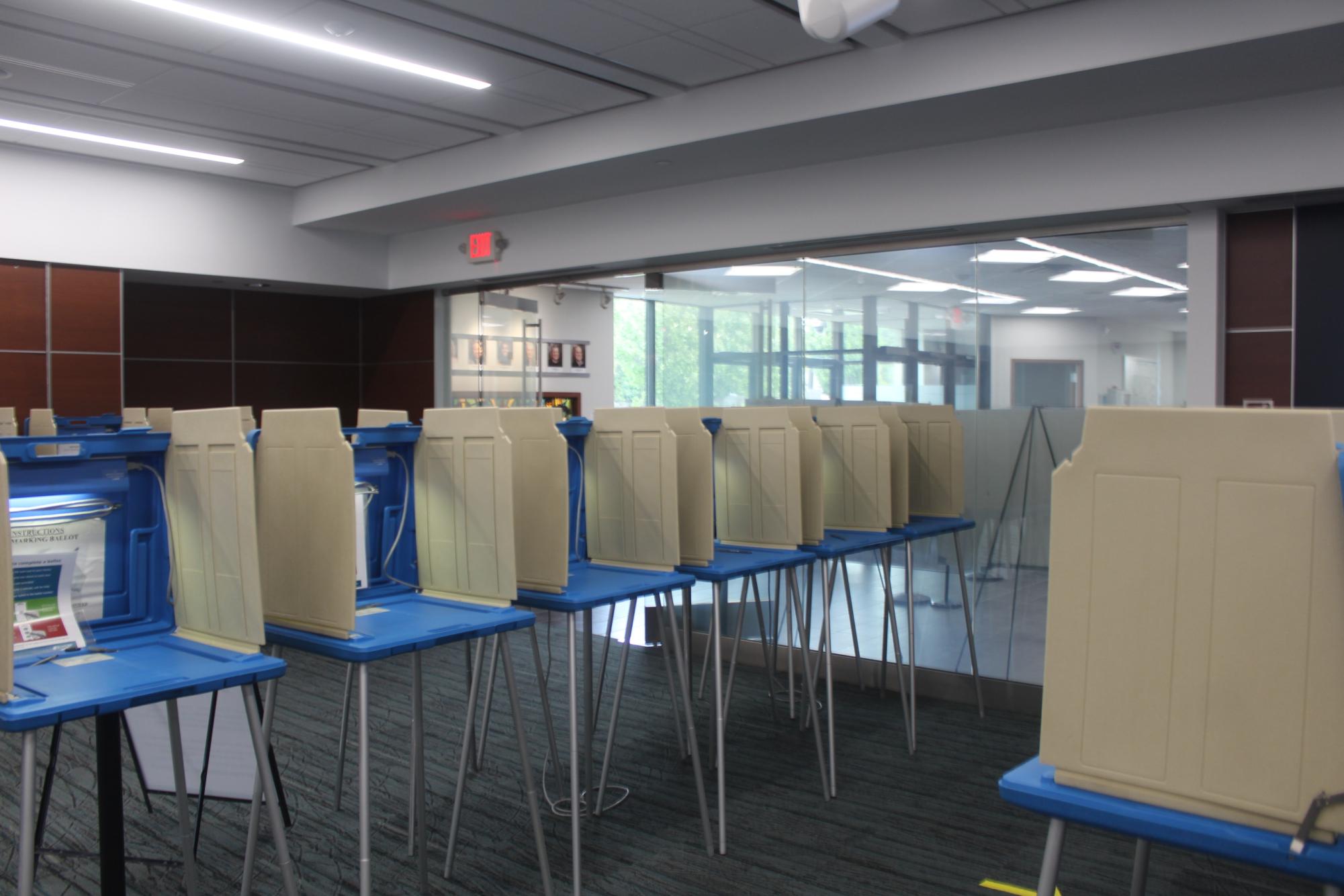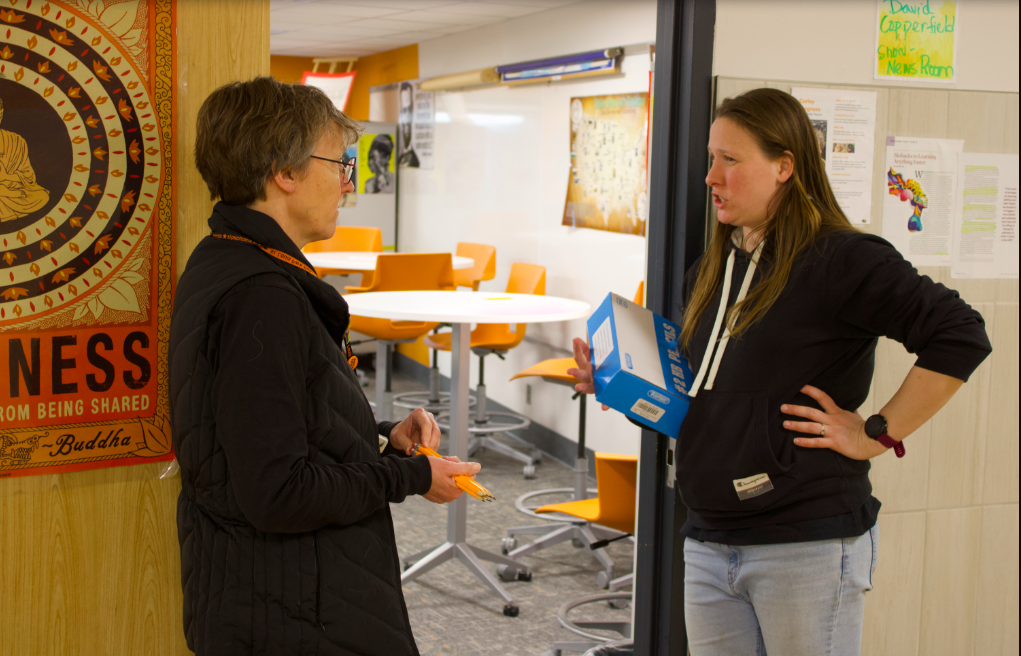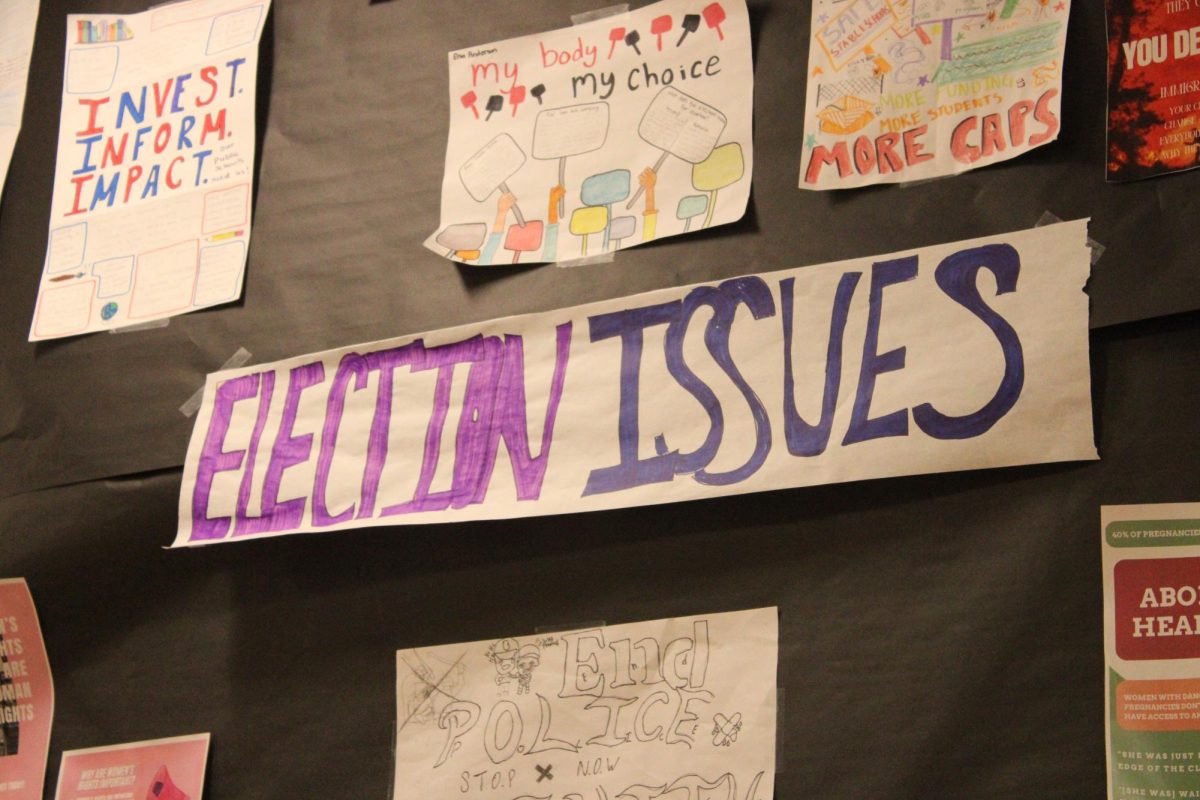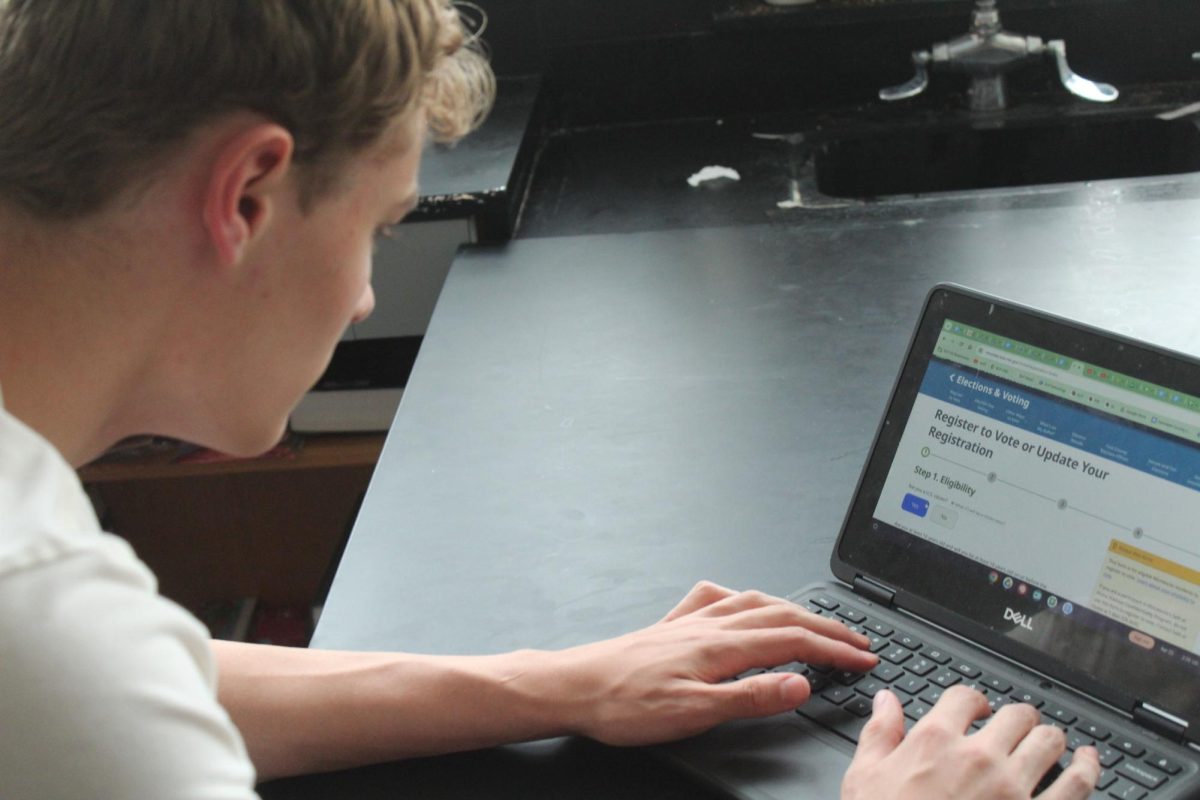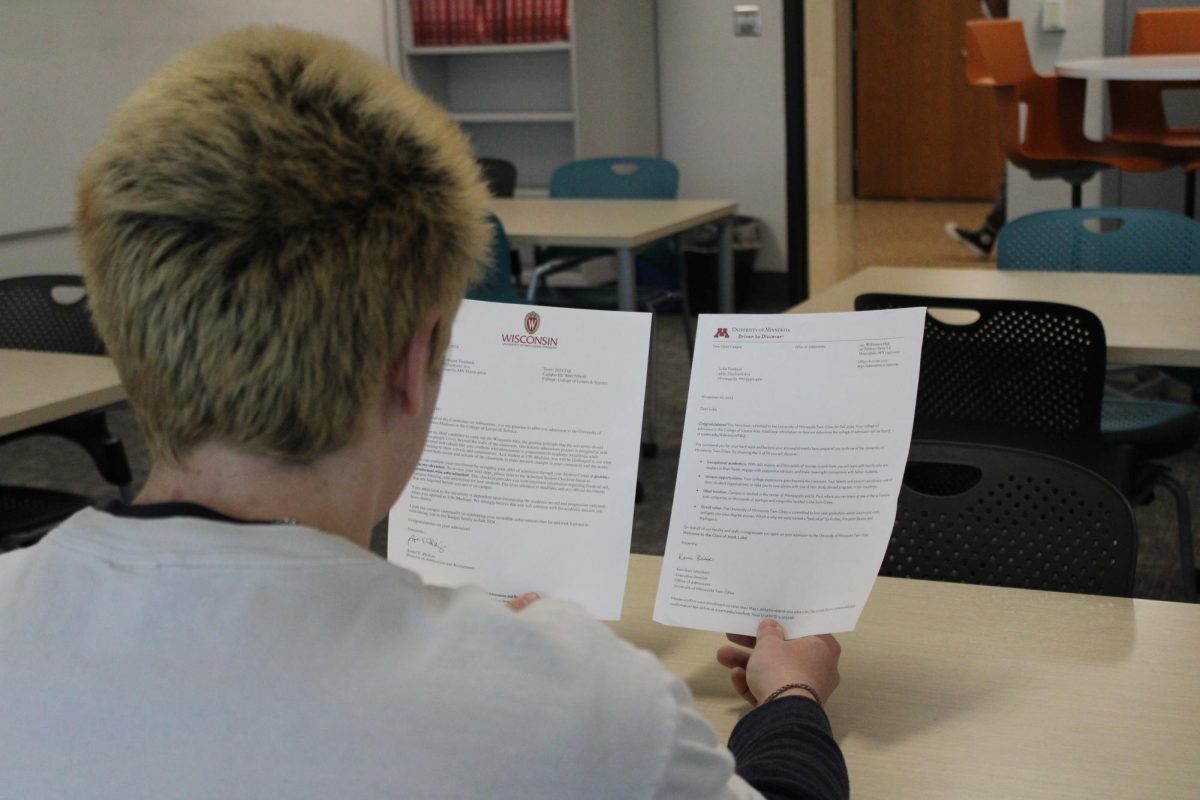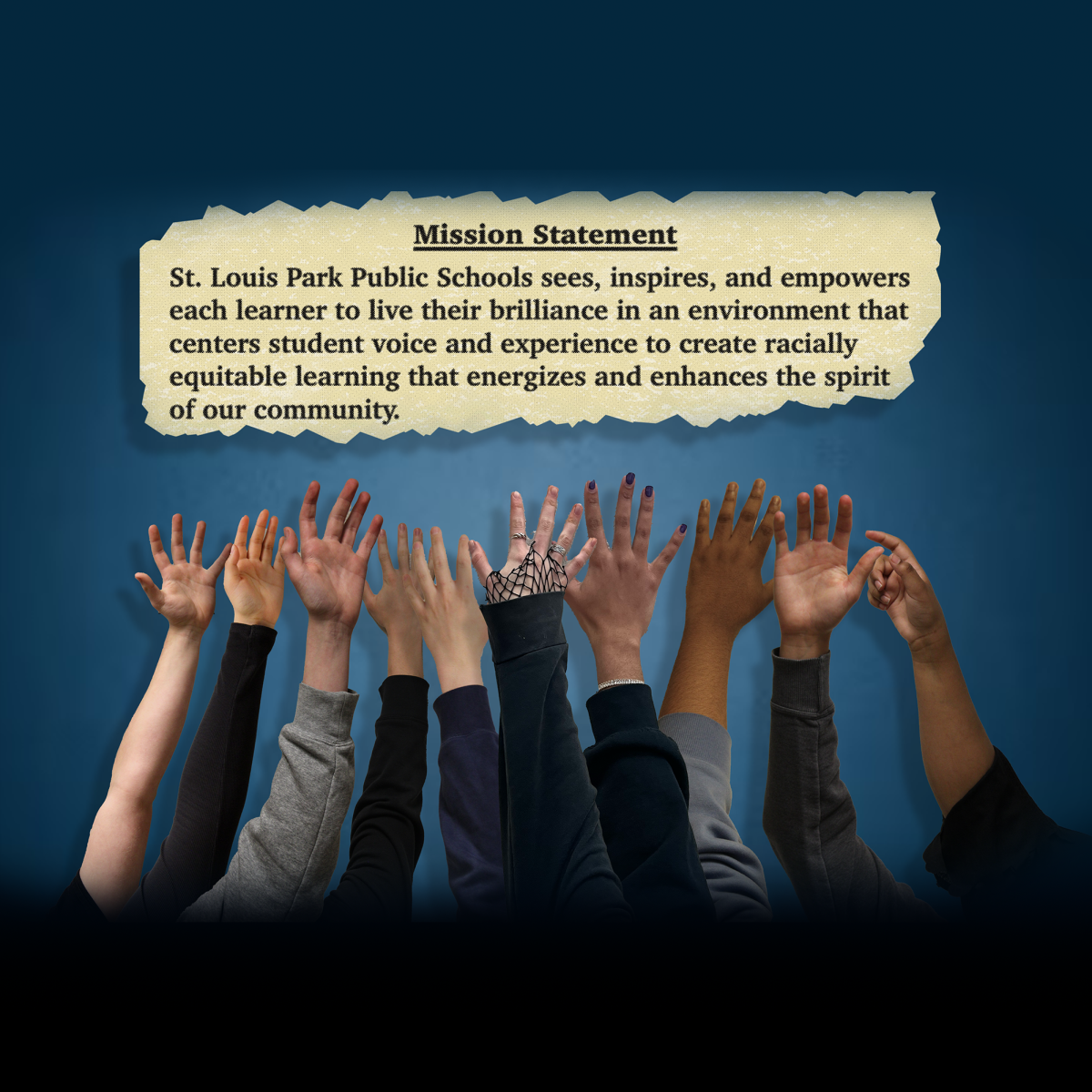Park to the polls
According to senior Jude Sadovsky, if he were 18 this year, he would vote. He said if people feel discontent with the current government, voting for a candidate can be a way to advocate for change.
“If I was 18, I would vote. I don’t really watch the news or pay much attention to politics in general, but I think it is important to express your voice and what you believe in,” Sadovsky said. “If you think the government is messed up or you have your own views on it, I think it’s still worth (it) to have some sense of hope, and that (hope) can be found in one of the candidates. I think that’s (voting) worth it.”
This year, Election Day falls on Nov 5—a Tuesday. Spanish teacher Hanna Anderson said she worries about the inconvenience of Election Day and that the voting process will deter voters, especially voters in school or demanding jobs, from voting.
“It’s hard for people who work. Especially in the US, when elections are on a Tuesday,” Anderson said. “I’m so glad this year, (that) it’s a non-school day (which) makes it easier. But everybody else has to work. In other countries, like Peru, elections are on a Sunday, and that day (is) a holiday. Your only job that day is to go out and vote. Here, people who work long hours find it very hard to vote. I’m concerned about people who would like to vote, but find it very challenging. A person (who says), ‘I’m not waiting in line for half an hour.’ I’m concerned about that.”
According to junior Adele Cormier, citizens have a civic responsibility to vote in an informed manner. Cormier said teenagers are more incentivized to vote in the 2024 Presidential Election due to the relevant issues on the ballot.
“It’s part of our duty as citizens to be not only voters, but informed voters,” Cormier said. “Candidates in this election motivate young people to vote more because issues are on the ballot that young people care about.”
According to Sadovsky, if current events were more integrated into Park’s history curriculum, students would be more inclined to vote in upcoming elections.
“It would be nice if we covered more current events. We did that in civics, but we haven’t done that recently at all,” Sadovsky said. “I think that would be nice, if we take some time in history to do that. I think that might be more encouraging (to vote).”
Cormier said she tends to befriend people with similar political values, and those peers tend to influence her political involvement and beliefs, including voting and the candidate she supports.
“I’m usually friends with people who agree more with the views I already have because that is usually the people you tend towards—people who you agree with,” Cormier said. “The peers around you can help inform your choices and give you more information that you didn’t have or more experience or insight into their lives and how that shapes who they’re voting for.”
According to junior Audrey Mancini, the political voice of teenagers has a strong influence over swaying adults to pay attention to a particular issue.
“It has a lot of impact, especially talking to adults,” Mancini said. “Typically when kids care a lot adults tend to see, at least in my experience, the importance of an issue.”
Anderson said being a citizen in the U.S. who can vote is a privilege that should be respected and exercised. She said those who choose not to vote are taking their privileges for granted.
“We were talking about being a resident versus being a citizen,” Anderson said. “One of the main privileges of being a citizen in the US, besides having access to certain programs, is being able to vote. A lot of people in the US take that for granted, and they are like, ‘Oh, l’m not sure I like any of the candidates. I’m just not gonna vote.’ That is really a privilege that we really all need to not take for granted and go out and vote.”
According to Park Superintendent Dr. Carlondrea Hines, youth are an important factor in the outcome of our future. She said gaining better political and social awareness is key to improvement.
“I believe that our youth have a very strong voice when it comes to where we go as a society,” Hines said. “We, as older people, have had our time, and you, as young people, need to help create the future that you would like to see. Becoming more aware of where we currently are and where you would like to see things go is the importance of being engaged, doing a lot of research, and fact-checking as individuals because we have our own thoughts and beliefs.”
Anderson said people are becoming reliant on social media as opposed to news outlets to receive information. She said politics in the media is difficult to avoid.
“(Social media) definitely makes people more visible,” Anderson said. “Not everybody watches the news nowadays—even I sometimes don’t find the time to watch the news. People are turning to social media for their news, and sometimes you can’t escape the ads—that is the way for candidates to get their message across, even if it’s a 30-second message that you can get somebody to pay attention to.”
Sadovsky said repetitiveness in ideas on social media feeds can cloud one’s judgment. He said that while there are positives to receiving information from the media, it doesn’t motivate many beliefs.
“If you give your data into the algorithms, over time, it’ll generate what it thinks is good for you and build up an echo chamber,” Sadovsky said. “There isn’t much room to grow your thinking, (which) can be dangerous but it can work to gain support in the masses of people, but doesn’t really encourage diversity, which is not the greatest thing, especially today.”
According to Kregness, digital platforms have played a minimal role in her political ideas due to a lack of social media presence in her youth. She said a lack of media engagement can form a disconnect between those who are disengaged in politics and those who are not.
“It’s different for my generation because I was already developed and especially as a history, social studies nerd, I already had really well developed ideas about what I wanted to vote for before social media was a thing. I had already shaped my views before social media, so they haven’t changed that much,” Kregness said. “(Social media) has a huge impact on lots of people for whom that’s not true and it still impacts what information I get and I am aware of that. It hasn’t changed my basic political beliefs, but I know it’s changing what I see and don’t see. For people who are less engaged than I am, it makes a bigger difference.”
A political celebrity endorsement is when a famous person utilizes their social standing to support presidential campaigns. While Cormier is not eligible to vote, she said endorsements are not a deciding factor in who she might vote for but they do influence her ideas surrounding candidates.
“From celebrities, it’s more of an ‘oh, I’m glad this person agrees with me’ so I don’t think I would be swayed completely by a celebrity endorsement,” Cormier said. “I would say definitely it can be a deciding factor in people who are thinking about voting for a candidate—if a celebrity endorses that they are also going to be voting for that candidate, it could push some hesitant voters to make it to the ballots.”
Mancini said endorsements strengthen her voting choices but are not the main element at hand when casting her vote. She said when celebrities endorse a candidate with whom her values align, she recognizes their shared values.
“They don’t necessarily change (my vote), but they reinforce it,” Mancini said. “If a celebrity endorses somebody I like, it shows that they have similar values to what I believe in, and they have stuff that I like about them.”
According to Cormier, when celebrities support a political candidate, the impact goes beyond young people. She said celebrity endorsement encourages the younger generation to get involved with voting.
“(Celebrities) can have a really big role especially with the young population because they are such role models for young people,” Cormier said. “Endorsement from celebrities can go a long way in convincing young people to not even vote for that candidate, but just to get interested in voting in general, in the election process and (in) the candidates.”
According to Hines, staff can’t share their political opinions at work. While they are allowed to engage politically outside of school, Park shouldn’t be associated with any of their actions.
“Employees may not express their personal views, opinions, beliefs or political issues,” Hines said. “They shouldn’t wear any political campaign buttons, what have you, they can’t use. They can’t post any political views on social media during their work day. They cannot use any district-issued devices in order to post any political views of that nature as well. We said that they can share factual information as part of a lesson on voting and the elections, and they can distribute political materials when they’re not at work. They’re free to do, outside of the work hours, anything politically, but we encourage them not to wear any SLP paraphernalia.”
Social studies teacher Carley Kregness says political neutrality is crucial for classrooms. Kregness said she tries to provide students with many different ways of thinking.
“It is essential for social studies teachers (to be politically neutral),” Kregness said. “We have to be neutral politically, but the word is interesting because I don’t believe in all neutrality. I don’t think we need to be morally neutral. I believe it’s okay to take stands about morality and behavior and things like that. But there are moral people in both parties, of course, so that’s an area in the political parties where we have to be neutral. How do I do that? I always have to present each side’s opinion from its own point of view. So I frequently find myself, when we’re talking about stuff like this, saying something like, ‘What the Republicans would say?’ or ‘What the Democrats would say?’ So it’s never my opinion, but trying to encourage students to see it through the eyes of the people who believe that philosophy, or at least to understand it through that lens. They don’t have to like it, but to understand what that lens is.”
Cormier said she recognizes she does not gain insight to all political perspectives as associating with people who have similar beliefs to her doesn’t paint the full picture.
“There’s one view that I think is more strongly represented, but again, that could also just be the people I’m interacting with,” Cormier said. “I realize that I have a relatively small view of people’s opinions within the school.”
According to Mancini, biases in school don’t change her views, and school isn’t the correct environment to discuss politics.
“I don’t think (my beliefs are swayed by school). I’m the type of person (where) I feel very strongly about my opinion, so (it’s) very hard to be persuaded in general,” Mancini said. “I go to school for school and not to hear about politics and what I should believe.”
Sadovsky said inherent biases play a role in how politics are presented at Park. He said depending on the political makeup of communities, their school’s values might differ from Parks’.
“This school is pretty progressive, so a lot of people here are Democrats or believe in the Democratic Party over the Republican one, so I think there’s that inherent bias,” Sadovsky said. “I mean, you might not call it that, but that’s what it is, essentially. I think for other schools, that might be the same or different, depending on what their values are.”
According to Anderson, classrooms can still be stimulating while being neutral. She said she values being a mediator so students have a forum to have political conversations.
“It needs to be politically engaging,” Anderson said. “It needs to be critical. It needs to be a place where students can actually explore and express their ideas. I sometimes have a problem with the word neutral because students are going to have to express their opinions. As a teacher, what you can do is facilitate that conversation and try to be a mediator. I don’t know if the classroom is necessarily going to be neutral or if a lot of people lean more toward a certain political view or way of thinking. Still, there is a minority that think a different way, and we learn to respect each other and try to understand each other’s point of view.”
Kregness said discussions about sensitive topics come up unexpectedly. She said she creates space for sharing all perspectives but shuts down harmful language.
“If I am intentionally setting out to teach something that I know people are gonna have strong feelings about, I have to re-establish that, ‘today, we’re going to respect everyone’s opinions. We’re going to express our opinions in a way that’s not intentionally offensive or demeaning to anybody else’,” Kregness said. “But it doesn’t always come up when I am prepared for it. It’s not like I’m not doing it every single day. If language crosses the line of being disrespectful or demeaning, then I have to call that out, racist or sexist or anything else like that, homophobic. But if the language is just one-sided, I don’t have to call that out because everybody’s entitled to their opinions.”
According to interim Assistant Principal Evelyn Lashley, facilitating conversations surrounding politics is better than silencing students. She said teachers try to ensure all students’ safety and well-being.
“We have teachers (who) are human beings,” Lashley said. “They’re going to have their own opinions, so just making sure that in classrooms, they’re making space for students to still be able to debate or discuss their opinions. The teacher’s role as a facilitator is ensuring that those conversations respect the humanity of the other person. The teacher’s role in those conversations is just a kind of mediator or a moderator to keep student voices being able to be in the space. I think silencing about it is not the way to go. Students should be able to voice opinions, but the struggle happens when students are going to feel passionate about something, and then maybe when they’re voicing it, they’re kind of coming at another student. So teachers have to help mediate that without siding with anybody.”





